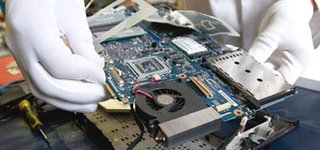 More analysis from Greenpace with their new toxicology report rating a few of most popular laptops. I was going to wax poetic on this, but someone else already did, a fellow by the name of Keith in the comments here. I have to post it in its entirety, it's too perfect:
More analysis from Greenpace with their new toxicology report rating a few of most popular laptops. I was going to wax poetic on this, but someone else already did, a fellow by the name of Keith in the comments here. I have to post it in its entirety, it's too perfect:It's really surprising and disappointing to see TH swallow the GP press kit without questioning or critical analysis. I have come to expect more from TH.
I read through Greenpeace's new "chemicals in computers" report. The title, and the headers on their press release, do not reflect at all the actual findings. Read it closer, please --the findings actually make the laptop manufacturers look pretty good, especially when you consider that the laptops in question were purchased months before compliance with the European Union's(EU) RoHS Directive was required (these were, after all, purchased in EU member states) and may have been the last of their kind (pre-RoHS) in stock...
No cadmium, mercury or hexavalent chrome found in any of the laptops.
Lead was only found in the HP model (Pavilion dv4357EA), and that in relatively low concentrations in solder (surprise, surprise).
No HBCD or PBB identified in any of the samples.
No PBDEs were found in the Dell and Sony models, while Apple (which Greenpeace has savaged in the press) and Acer had only trace (basically negligible and certainly under the levels allowed by EU law) levels of PBDEs.
No TBBPA (a chemical not banned by the RoHS Directive) was found in the Sony model, and only traces found in the others.
The amount of PVC (also not banned by the RoHS Directive, or by national laws) was also very low: only a single wire in the Acer and Apple (both slammed in the "Greener Electronics" report), and two wires in the HP model.
TH calls this "ripe with toxins"????
GP played up in the press release the few chemicals of concern they actually found, and tried to make much of finding bromine compounds, even though they could not prove most of it resulted from brominated fire retardants (TH leaves the opposite impression in this article). GP fretted that if these units are incinerated, the bromine compounds can become a toxic hazard. But is this worry truly significant? How often are end-of-life (EOL) electronics actually incinerated in the developing countries Greenpeace says it is worried about? Not often at all in Latin America and the Caribbean, I can tell you (as someone who has written alot about waste management in LAC nations).
I suppose it's good that GP tried to get at least *some* concrete test data instead of relying solely on published corporate claims, but this was not the way to do it. But please, in testing and statistical terms, five units bought in 2 countries proves little.
Why, given the funds they command, the number of office they have worldwide, and their expressions of concern about *global* hazardous material management, did they not test more units from more countries, including some non-EU (preferably some from developing nation markets such as Mexico and Brazil)?
If they don't want to spend the money or are not up to the job, why not team up with consumer testing groups with proven track records such as Consumers Union US (publisher of Consumer Reports)? Surely CU would do a better job of testing & reporting than GP has done so far.
The lack of transprency in their selection criteria for these test is just like the lack of transparency in why they picked which manufacturers and which critera they covered in the "Greener Electronics" report. Why these 5 firms, and these 5 models, instead of all 14 firms & types of electronics targeted in the "Greener Electronics" scorecard? Why pick the UK and Denmark to buy the units? Picked at random? Based on market share/size? Something else? Why only laptops, and not other electronics (no, they didn't test game consoles)? They don't say, leaving them open to questions about their motives in what they pick to test.
I guess it's good that they carried through their prior threat to downgrade anyone (in this case HP) they decide is not living up to their public claims on chemicals. But why then, did they not upgrade Acer and Apple for being better on this than expected in these tests? Haven't they said that they want to encourage positive corporate behavior?
GP needs to clean up its act. If they continue in this manner they may score media points in the early going, but will lose ground if the electronics industry ever mounts a well, conceived, well-documented, assertive counter-campaign.
Well, if you care to hear more musings (rantings?) about this, check my own blog.
And just for that, I'm linking him, both here and on my link list.

No comments:
Post a Comment